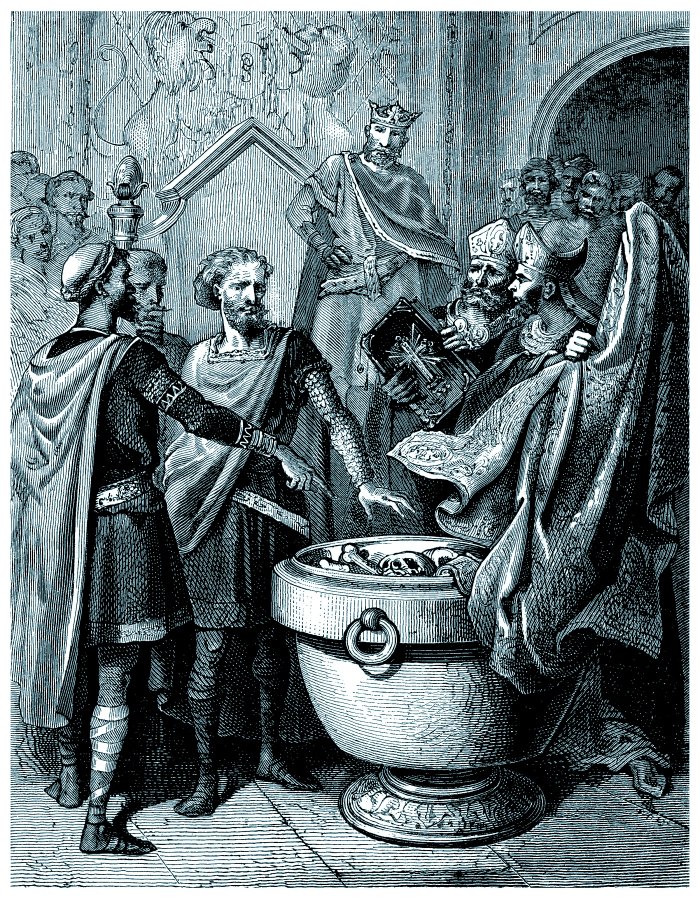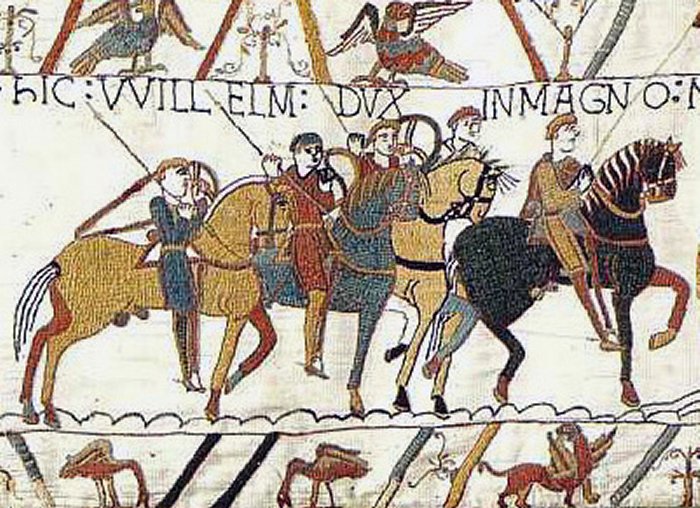William The Conqueror: Ruthless And Powerful Ruler Who Changed Britain Forever
A. Sutherland - AncientPages.com - Wilhelm I Conqueror, also known as "William the Bastard" (ca. 1028 -1087), was King of England and Duke of Normandy.
William the Conqueror & Harold II swearing - 11th century. Image: Adobe Stock - Erica Guilane-Nachez
William was the son of Herleva and Robert I, the Duke of Normandy, France, then known as “Francia”). William was frequently called a bastard, especially by his opponents. The reason was that his mother actually never married his father, Robert, most probably because Herleva was a simple Anglo-Saxon woman and not of noble birth.
Although he was the illegitimate son of the Duke of Normandy Robert the Magnificent (also called "Robert the Devil"), after his father's death in 1035, William was named his successor at only eight years of age. Under the name of William II (in French: Guillaume II), the boy became the new duke of Normandy during a challenging time.
William The Conqueror's Struggle To Gain Power
Corruption, violence, and strong opposition from powerful Norman barons, his bitter rivals, plagued his early reign.
Three of his guardians and his tutor died violent deaths during his childhood. William witnessed the end of his steward, Osbern, whose throat was cut by a Norman rebel while sleeping in William's bed-chamber.
William managed to survive the early years of chaos, both in his own life and in Normandy, with the help of King Henry I of France. From 1046 onwards, he successfully dealt with rebels, troublesome Norman barons, and all those who questioned the right of a bastard to succeed. Then with the support of Henry I, he began to expand his territory.
A late-1800s engraving shows William the Conqueror after the Battle of Hastings. Source
In 1051 the king of England, Edward the Confessor, appointed William as his successor. Edward died in 1066, leaving no direct heirs, and the country was threatened with invasion by two rival claimants, Harald Hardrada, King of Norway, and William, Duke of Normandy.
The English nobles elected to the throne their candidate - Harold Godwin (also called Harold Godwineson or Godwinson), the most powerful of the English lords.
William gathered his army and landed on the island. He was angry; Harold claimed the throne of England for himself, even though he made an oath to William to support his claim. On October 14, 1066, the two armies met in the famous Battle of Hastings.
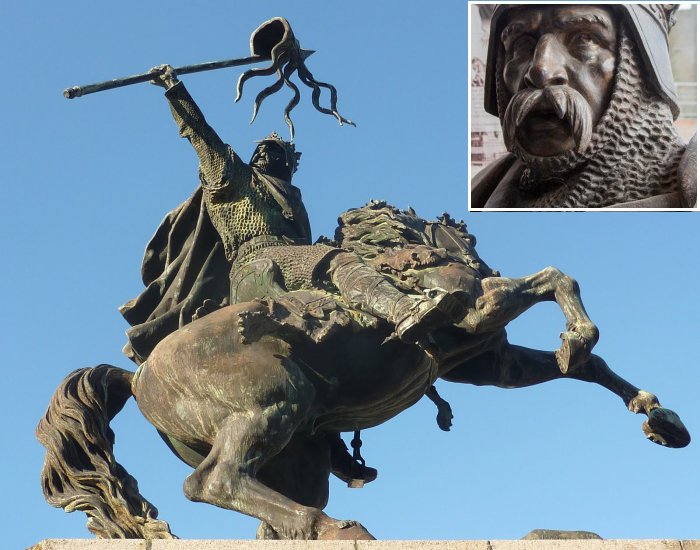 William, I was victorious and he took London without further resistance. Image credit: Man vyi - Public Domain
William, I was victorious and he took London without further resistance. Image credit: Man vyi - Public Domain
According to modern scholars' estimation, each of the sides had between 5,000 and 7,000 men.
William The Conqueror Becomes King Of England
King Harold and his two brothers were killed in the battle. William, I was victorious; he took London without further resistance. He was crowned king of England on Christmas Day, 1066, and ruled until he died in 1087.
However, the conquest of England had not yet ended. Several revolts marked the next five years, and William used them as an excuse to confiscate English land and declare it his property. Subsequently, he distributed the land to his Norman knights, who imposed their unique feudal system.
The following important issue was a nationwide inventory of property landlords and property of the people. William had to determine the taxes he had to pay all his subjects.
The Bayeux Tapestry, chronicling the English/Norman battle in 1066 which led to the Norman Conquest. Image credit: alipaiman - Public Domain
Once an entire picture of England was collated in the Domesday Book, William could send his tax gatherers out. Eventually, the Normans replaced the whole of the Anglo-Saxon aristocracy.
His famous "The Domesday Book" was a detailed register of the population and property of England (now an invaluable source of historical information and still in the Public Record Office in London).
William died on September 9, 1087, in Rouen, France. He had four sons and five daughters; every monarch of England since has been his direct descendant.
He never spoke English and was illiterate, but his influence on England and the English language was enormous.
"William the Conqueror was a fierce warrior that may cause gentler people to shudder. However, our world needs such people. Without them, we might destroy ourselves and our civilizations based on disorganization and a lack of cohesive leadership..." 1
Written by – A. Sutherland AncientPages.com Staff Writer
Updated on February 25, 2023
Copyright © AncientPages.com All rights reserved. This material may not be published, broadcast, rewritten or redistributed in whole or part without the express written permission of AncientPages.com
Expand for referencesReferences:
Ed Sharrow - The Last Battle: The Life of William the Conqueror
Edward Freeman - William the Conqueror
Abbott Jacob, William the Conqueror
- in60Learning, William the Conqueror: The King Who Changed the Course of British History
More From Ancient Pages
-
 1.5-Million-Year-Old Footprints Of Two Different Species Of Human Ancestors Found At The Same Spot
Human Beginnings | Nov 29, 2024
1.5-Million-Year-Old Footprints Of Two Different Species Of Human Ancestors Found At The Same Spot
Human Beginnings | Nov 29, 2024 -
 Codex Gigas – The Devil’s Bible – Ancient Secrets Of The World’s Largest Book
Artifacts | Jun 15, 2014
Codex Gigas – The Devil’s Bible – Ancient Secrets Of The World’s Largest Book
Artifacts | Jun 15, 2014 -
 Stone Age Statues Were Taken To Britain For Restoration In 1990 – Never Returned Home To Jordan
News | Apr 6, 2021
Stone Age Statues Were Taken To Britain For Restoration In 1990 – Never Returned Home To Jordan
News | Apr 6, 2021 -
 What Is The Codex Sinaiticus And What Does It Mean?
Ancient History Facts | Feb 5, 2019
What Is The Codex Sinaiticus And What Does It Mean?
Ancient History Facts | Feb 5, 2019 -
 Medieval Grave And Skeleton With Arrow In Chest Unearthed In Ancient City Of Plovdiv, Bulgaria
Archaeology | Dec 28, 2017
Medieval Grave And Skeleton With Arrow In Chest Unearthed In Ancient City Of Plovdiv, Bulgaria
Archaeology | Dec 28, 2017 -
 Cog Stones – Unusual Stone Discs Made By An Ancient Lost Civilization In California
Artifacts | Jan 4, 2018
Cog Stones – Unusual Stone Discs Made By An Ancient Lost Civilization In California
Artifacts | Jan 4, 2018 -
 Prehistoric Feces At Stonehenge Reveal The Earliest Evidence For Intestinal Parasites In The UK
Archaeology | May 21, 2022
Prehistoric Feces At Stonehenge Reveal The Earliest Evidence For Intestinal Parasites In The UK
Archaeology | May 21, 2022 -
 Amaterasu: Shinto Goddess Of The Sun And Priestess-Queen Sister To Controversial Susanoo God Of Storms
Featured Stories | Jan 25, 2019
Amaterasu: Shinto Goddess Of The Sun And Priestess-Queen Sister To Controversial Susanoo God Of Storms
Featured Stories | Jan 25, 2019 -
 Never-Before-Seen Ancient Frescoes Discovered Inside The Dormition Cathedral
Archaeology | Feb 28, 2020
Never-Before-Seen Ancient Frescoes Discovered Inside The Dormition Cathedral
Archaeology | Feb 28, 2020 -
 142,000-Year-Old Shell Beads Found In A Cave Are The Oldest Known Evidence Of Human Communication
Archaeology | Oct 16, 2021
142,000-Year-Old Shell Beads Found In A Cave Are The Oldest Known Evidence Of Human Communication
Archaeology | Oct 16, 2021 -
 Why Were The Jews Exiled To Babylon?
Ancient History Facts | Jan 14, 2020
Why Were The Jews Exiled To Babylon?
Ancient History Facts | Jan 14, 2020 -
 Dunstanburgh Castle: Underground Passageways And The Legend Of Sir Guy The Seeker
Featured Stories | Apr 5, 2016
Dunstanburgh Castle: Underground Passageways And The Legend Of Sir Guy The Seeker
Featured Stories | Apr 5, 2016 -
 Face Of Very Old “Vampire” Buried In Connecticut Reconstructed
Archaeology | Nov 9, 2022
Face Of Very Old “Vampire” Buried In Connecticut Reconstructed
Archaeology | Nov 9, 2022 -
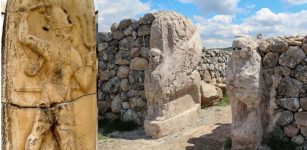 Drought Accelerated Hittite Empire Collapse – New Study Suggests
Archaeology | Feb 12, 2023
Drought Accelerated Hittite Empire Collapse – New Study Suggests
Archaeology | Feb 12, 2023 -
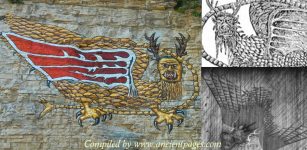 Mysterious Piasa Bird – Native American Dragon That Existed Thousands Of Moons Before The Pale Face Came
Featured Stories | Jan 1, 2018
Mysterious Piasa Bird – Native American Dragon That Existed Thousands Of Moons Before The Pale Face Came
Featured Stories | Jan 1, 2018 -
 Skofnung – Formidable Sword With Supernatural Powers That Belonged To Legendary Danish King Hrólf Kraki
Featured Stories | Mar 3, 2018
Skofnung – Formidable Sword With Supernatural Powers That Belonged To Legendary Danish King Hrólf Kraki
Featured Stories | Mar 3, 2018 -
 Oldest Evidence Of Beer Comes From Raqefet Cave, Dating Back To 11,000 B.C.
Archaeology | Sep 27, 2024
Oldest Evidence Of Beer Comes From Raqefet Cave, Dating Back To 11,000 B.C.
Archaeology | Sep 27, 2024 -
 Extremely Unique Ancient Roman Arm Guard Found At Trimontium Fort – Restored And On Display For The First Time Ever
Archaeology | Jan 22, 2024
Extremely Unique Ancient Roman Arm Guard Found At Trimontium Fort – Restored And On Display For The First Time Ever
Archaeology | Jan 22, 2024 -
 On This Day In History: Storming Of The Paris Fortress – Prison Bastille – On July 14, 1789
News | Jul 14, 2016
On This Day In History: Storming Of The Paris Fortress – Prison Bastille – On July 14, 1789
News | Jul 14, 2016 -
 Secret Coded Boontling Language Of Northern California
Ancient History Facts | Apr 8, 2019
Secret Coded Boontling Language Of Northern California
Ancient History Facts | Apr 8, 2019

